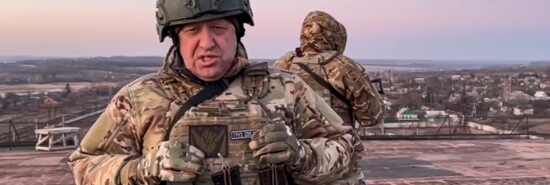
Yevgeny Prigozhin, 1961-2023
Neil Hauer
Even the world’s best caterers don’t live forever, and Yevgeny Prigozhin, founder of Russia’s PMC Wagner mercenary outfit, was no exception.
Two months to the day after marching his troops hundreds of miles toward Moscow to “sort things out” with Russia’s military leadership, Prigozhin’s luck finally ran out. Late on Wednesday local time, reports emerged that a jet belonging to the erstwhile Wagner head had crashed somewhere in the Tver region, northwest of Moscow, with Prigozhin himself on board. Dramatic footage soon emerged of the plane falling from the sky after being struck by an anti-aircraft missile, exploding in a fireball on the ground. Various sources soon confirmed it: Prigozhin, 62, was dead.
TOP THREE TAKEAWAYS FROM THE REPUBLICAN DEBATE IN MILWAUKEE
Few figures in recent Russian history have risen to such dizzying heights — or fallen as fast. Much like Russian President Vladimir Putin, Prigozhin got his start in St. Petersburg in the 1990s, first selling hot dogs at the market before moving into the restaurant and grocery store business. Following Putin’s ascension as president, Prigozhin became a favored client of the new leader, his firm winning numerous catering contracts totaling hundreds of millions of dollars.
Yet his appetite went far beyond the dining hall. With Russia’s first invasion of Ukraine’s Donbas region in 2014, Prigozhin tabled a new business idea: a mercenary outfit. The group, PMC (short for “private military company”) Wagner, would get its start in Moscow’s irregular intervention in eastern Ukraine that year, hiring veteran Russian soldiers for sums much higher than the army’s meager pay to participate in officially nonexistent military operations for the Kremlin. Wagner then played a key role in Russia’s intervention in Syria from late 2015 onward, serving on the ground as a light infantry force to spearhead Russian efforts to aid Syrian leader Bashar al Assad’s forces in recapturing territory from the Islamic State group and other rebels.
As Putin launched his full-scale invasion of Ukraine, he found need of Prigozhin and his mercenaries once more. Alongside, but crucially, separate from the Russian army, Wagner fought in several key areas of the Donbas front, being given responsibility for the capture of Popasna in spring 2022, opening the way for further Russian advances. Prigozhin, who had denied all links with Wagner to date, also publicly took ownership of the group.
Wagner and its new recruits were placed in charge of the conquest of the Donbas city of Bakhmut and gifted with tanks, artillery, and all manner of military hardware. While they would eventually succeed, the ensuing period saw Prigozhin’s open rivalry with the Russian military leadership — in particular, Defense Minister Sergei Shoigu and chief of staff Valery Gerasimov — grow to the point of open insults and profanity-laced tirades. With Wagner’s access to men and materiel dropping, Prigozhin stunned the world by turning his tanks around on June 23 and marching them in the direction of Moscow, vowing to remove the “traitorous” military leadership there. His troops took over the city of Rostov-on-Don and made it within two hours’ drive of the capital, downing half a dozen Russian helicopters on the way, before just as suddenly accepting a deal brokered by Belarus’s Alexander Lukashenko, including Lukashenko’s offer of exile.
What would become of Prigozhin since then had been unclear. Moscow may have dispensed with the need for his troops in Ukraine, but Wagner was still crucial to numerous Russian foreign policy operations, notably in Africa. At any rate, Putin clearly had had enough. His termination on Wednesday of not only Prigozhin but also Dmitry Utkin, Wagner’s head of military operations (on board the same jet), has likely ended Wagner’s operations for good. With its two key leaders eliminated, it seems implausible that any other figure might have the influence to keep the group together in the face of the Russian military’s efforts to disband it.
Yevgeny Prigozhin was seemingly a man out of another century of Russian politics. A loyal satrap-turned-insurrectionist, his march on Moscow had more in common with the 18th-century rebellion of Pugachev against Catherine the Great or Gen. Kornilov’s march on the then-capital St. Petersburg in 1917 than anything in the Putin era. But while Russia’s leader emerged the victor now, future historians may well point to Prigozhin as the man who heralded the beginning of the end for Vladimir Putin’s reign.
CLICK HERE TO READ MORE FROM THE WASHINGTON EXAMINER
Neil Hauer is a Canadian journalist writing on Russia and the Caucasus.
